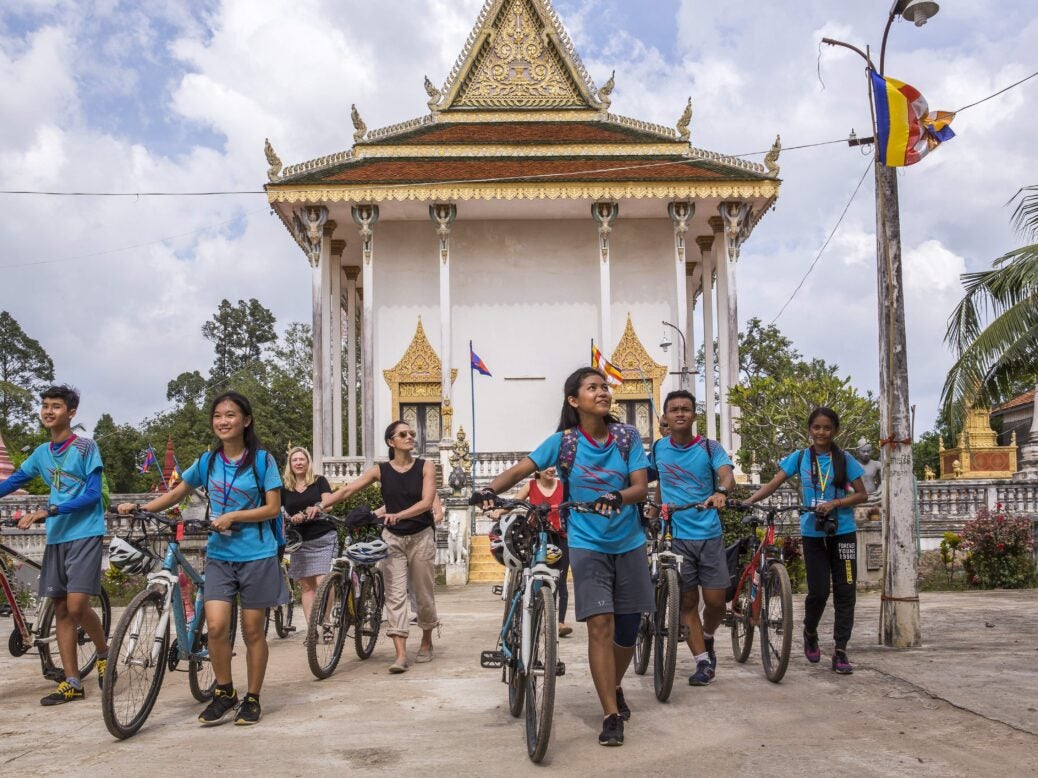
The philanthropic Liger Academy teaches promising Cambodian children the skills to succeed. Arun Kakar talks to its co-founder about how to create sustainable impact
‘We bought a piece of jungle, literally a piece of jungle,’ recalls Agnieszka Tynkiewicz-Gile. That was ten years ago, when Tynkiewicz-Gile and her husband Trevor Gile founded the Liger Leadership Academy in Cambodia – an institution that’s stated aim is to nurture ‘highly-skilled entrepreneurial thinkers who are globally-minded, determined, ethical, passionate, and effective’. In both scale and scope, Tynkiewicz-Gile doesn’t shy away from the ambitiousness of the project, which focuses on children aged eight to 15.
Liger’s origins can be traced to the nineties, when Polish-born Tynkiewicz-Gile and husband Trevor, technology investor and entrepreneur, decided to ‘sell everything and go on a trip around the world’. A love affair with Cambodia soon developed. ‘There were so many possibilities,’ she tells Spear’s of her first trip to the country.
‘I felt that connection because of the genocide they went through recently,’ she adds. ‘Me as Polish originally, I could relate to that – my whole family has really suffered a lot from the holocaust and I lost a lot of family members. I can understand how these people feel – It was quite fresh.’
When the couple returned to Cambodia several years later, they arrived with cash and plans. An interior designer by trade, Tynkiewicz-Gile took to the challenge with relish, designing the campus just outside the capital city of Phnom Penh. The intention from the outset was for the academy to be different, with a long view to creating a sustainable impact to the country.
‘So we wanted to reimagine international aid, we didn’t want to do what everybody does like put your typical Band-Aid on whatever you need is and see the immediate result,’ she says. ‘We wanted to see long-term results, and we thought, “How can we do this?”’
‘The obvious choice, is through education, but a different approach to education.’
The Liger Academy operates on a model of project based and experiential learning, reaching beyond traditional subjects with the aim of creating a pool of students that ‘will change the lives of many’. Its approach that has borne fruit. By their 15th birthday, alumni have gone on to become published authors, app and crypto developers, robotics engineers and award-winning filmmakers.
The Liger Marine Research Team, for example, is a group of eight students from the academy that is collaborating with Marine Conservation Cambodia to deploy artificial reefs of the country’s coastlines. Another group of ten students between the age of 12 and 13 created a textbook covering six sectors of the Cambodian economy, which was distributed to 500 schools across the country.
The selection process is rigorous: more than 8,000 students are screened, but only 50 to 60 make the cut.
‘We go out to the provinces,’ Tynkiewicz-Gile explains of the Academy’s recruitment process. ‘We are really trying to cover all of Cambodia, and we are really trying to give all the students an equal chance so we sort of worked our own system.’
Students receive full scholarships, which includes tuition, room and board, clothing, vaccinations, medical and dental care, health insurance, school supplies, and transportation. With 110 pupils in the academy, this is all rather extraordinary. Unsurprisingly, setting up the academy took a significant amount of time, investment and effort.
As well as a significant amount of investment, time and effort, the Liger project presented several initial challenges to the couple from termites and snakes to finding ‘people on the ground’. It was a team effort from the start.
The most crucial part of every business are the people to find the right people and work with them,’ Tynkiewicz-Gile says. ‘I never say “you’re working for me”, you’re working with me, we’re working together and both my husband and I are the kind of people that are rolling up our sleeves.’
It’s been a success so far, but Tynkiewicz-Gile views the academy as just the beginning of a bigger international project – one that co-ordinates with governments, private companies and most importantly, the students. ‘We invested a meaningful amount of money into something that we believed,’ she says. ‘Now we got to the point, [where] just like every business, we proved that it works. We have evidence, we have all these amazing students, and we are open for business.’
Arun Kakar writes for Spear’s
Read more










